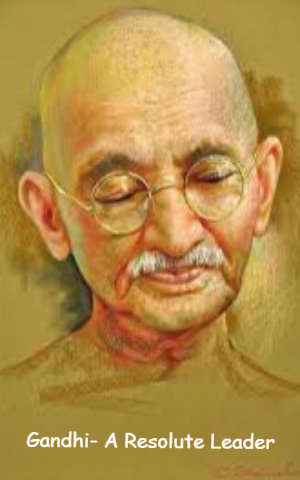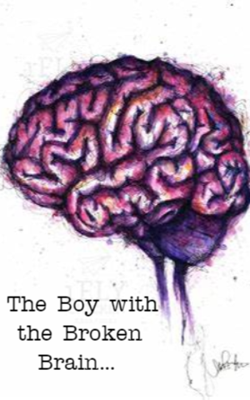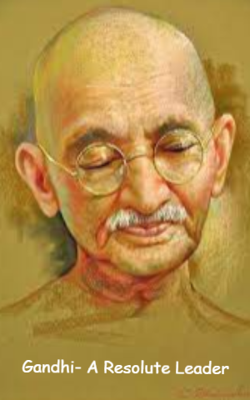Gandhi - A Resolute Leader
Gandhi - A Resolute Leader


Mahatma Gandhi, byname of Mohandas Karamchand Gandhi, (born October 2, 1869, Porbandar, India—died January 30, 1948, Delhi), Indian lawyer, politician, social activist, and writer who became the leader of the nationalist movement against the British rule of India. As such, he came to be considered the father of his country. Gandhi is internationally esteemed for his doctrine of nonviolent protest to achieve political and social progress.
Gandhi's first major achievement came in 1917 with the Champaran agitation in Bihar. The Champaran agitation pitted the local peasantry against their largely British landlords who were backed by the local administration. The peasantry was forced to grow Indigofera, a cash crop for Indigo dye whose demand had been declining over two decades, and were forced to sell their crops to the planters at a fixed price. Unhappy with this, the peasantry appealed to Gandhi at his ashram in Ahmedabad. Pursuing a strategy of nonviolent protest, Gandhi took the administration by surprise and won concessions from the authorities.
In 1919 after the World War I was over, Gandhi (aged 49) sought political co-operation from Muslims in his fight against British imperialism by supporting the Ottoman Empire that had been defeated in the World War. Gandhi felt that Hindu-Muslim co-operation was necessary for political progress against the British. Gandhi's support to the Khilafat movement led to mixed results. It initially led to a strong Muslim support for Gandhi. However, the Hindu leaders including Rabindranath Tagore questioned Gandhi's leadership because they were largely against recognising or supporting the Sunni Islamic Caliph in Turkey. The increasing Muslim support for Gandhi, after he championed the Caliph's cause, temporarily stopped the Hindu-Muslim communal violence.
With his book Hind Swaraj (1909) Gandhi, aged 40, declared that British rule was established in India with the co-operation of Indians and had survived only because of this cooperation. If Indians refused to co-operate, British rule would collapse and swaraj would come. Gandhi with Dr. Annie Besant en route to a meeting in Madras in September 1921. Earlier, in Madurai, on 21 September 1921, Gandhi had adopted the loin-cloth for the first time as a symbol of his identification with India's poor. In February 1919, Gandhi cautioned the Viceroy of India with a cable communication that if the British were to pass the Rowlatt Act, he would appeal to Indians to start civil disobedience. The British government ignored him and passed the law, stating it would not yield to threats. The satyagraha civil disobedience followed, with people assembling to protest the Rowlatt Act. On 6 April 1919, a Hindu festival day, he asked a crowd to remember not to injure or kill British people, but to express their frustration with peace, to boycott British goods and burn any British clothing they owned. On 13 April 1919, people including women with children gathered in an
Amritsar park, and a British officer named Reginald Dyer surrounded them and ordered his troops to fire on them. The resulting Jallianwala Bagh massacre (or Amritsar massacre) of hundreds of Sikh and Hindu civilians enraged the subcontinent. In 1921, Gandhi was the leader of the Indian National Congress. He reorganised the Congress. With Congress now behind him, and Muslim support triggered by his backing the Khilafat movement to restore the Caliph in Turkey, Gandhi had the political support and the attention of the British Raj.
Gandhi expanded his nonviolent non-co-operation platform to include the swadeshi policy – the boycott of foreign-made goods, especially British goods. Linked to this was his advocacy that khadi (homespun cloth) be worn by all Indians instead of British-made textiles. Gandhi exhorted Indian men and women, rich or poor, to spend time each day spinning khadi in support of the independence movement. In addition to boycotting British products, Gandhi urged the people to boycott British institutions and law courts, to resign from government employment, and to forsake British titles and honours. Gandhi thus began his journey aimed at crippling the British India government economically, politically and administratively.
Salt March, also called Dandi March or Salt Satyagraha, major nonviolent protest action in India led by Mohandas (Mahatma) Gandhi in March–April 1930.
Salt production and distribution in India had long been a lucrative monopoly of the British. Through a series of laws, the Indian populace was prohibited from producing or selling salt independently, and instead Indians were required to buy expensive, heavily taxed salt that often was imported. This affected the great majority of Indians, who were poor and could not afford to buy it. Indian protests against the salt tax began in the 19th century and remained a major contentious issue throughout the period of British rule of the subcontinent.
In early 1930 Gandhi decided to mount a highly visible demonstration against the increasingly repressive salt tax by marching through what is now the western Indian state of Gujarat from his ashram (religious retreat) at Sabermati (near Ahmadabad) to the town of Dandi (near Surat) on the Arabian Sea coast. He set out on foot on March 12, accompanied by several dozen followers. After each day’s march the group stopped in a different village along the route, where increasingly larger crowds would gather to hear Gandhi rail against the unfairness of the tax on poor people. Hundreds more would join the core group of followers as they made their way to the sea until on April 5 the entourage reached Dandi after a journey of some 240 miles (385 km). On the morning of April 6, Gandhi and his followers picked up handfuls of salt along the shore, thus technically “producing” salt and breaking the law.
Gandhi opposed providing any help to the British war effort and he campaigned against any Indian participation in the World War II. Gandhi's campaign did not enjoy the support of Indian masses and many Indian leaders such as Sardar Patel and Rajendra Prasad. His campaign was a failure. Over 2.5 million Indians ignored Gandhi, volunteered and joined the British military to fight on various fronts of the allied forces. Gandhi opposition to the Indian participation in the World War II was motivated by his belief that India could not be party to a war ostensibly being fought for democratic freedom while that freedom was denied to India itself. As the war progressed, Gandhi intensified his demand for independence, calling for the British to Quit India in a 1942 speech in Mumbai. This was Gandhi's and the Congress Party's most definitive revolt aimed at securing the British exit from India. The British government responded quickly to the Quit India speech, and within hours after Gandhi's speech arrested Gandhi and all the members of the Congress Working Committee. His countrymen retaliated the arrests by damaging or burning down hundreds of government owned railway stations, police stations, and cutting down telegraph wires.
Gandhi felt it was his responsibility to fight for India's rights. Mahatma Gandhi was important because he led India into freedom from the British. Also, he influenced many people and places other than India. He changed history by protesting non-violently and gaining independence for India. Gandhi is important to us today because he influenced Martin Luther King, so now African-Americans have equal rights. Gandhi was an honorable politician. Many people in the world get inspired and want to be like him. He is seen as a hero who gained India's liberation from Britain and unfair laws. Though some people like Nathuram Godse did not like him and assassinated him, the majority of people loved him as the 'father of nation' and the 'great soul'.
Gandhi was a man who was able to fast for his people's freedom and was not afraid to go to jail. He was always ready to sacrifice.


























































